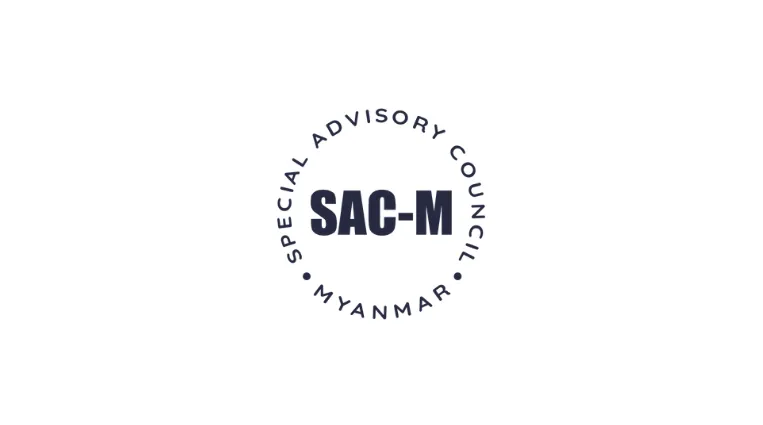Crisis In Rakhine: UN Human Rights Council Must Convene Urgent Special Session On Myanmar
19 May 2024

19 May 2024: The Rohingya people in western Myanmar are again at risk of genocide. The United Nations (UN) Human Rights Council must address this risk and the worsening human rights emergency in Myanmar generally, by convening an urgent special session, says the Special Advisory Council for Myanmar (SAC-M).
This weekend, Rohingya remaining in Buthidaung township, northern Rakhine state, have reported being targeted with coordinated killings, large-scale arson attacks and shelling, beginning on Friday 17 May. 200,000 people are reported to be displaced with unconfirmed numbers of casualties. Credible sources cite Arakan Army soldiers as committing the attacks. The Arakan Army claimed on 18 May that its forces had seized the last remaining Myanmar military junta bases in Buthidaung township, which borders Bangladesh. The Human Rights Council must convene an urgent special session to address the crisis.
The Arakan Army has been one of the most effective armed groups opposing the vicious Myanmar military following the attempted coup in February 2021. Since last October it has succeeded in defeating the military throughout much of northern Rakhine state and southern Chin state in western Myanmar. It has also joined other resistance forces in freeing large areas of north-east Myanmar. Now, however, it seems to be turning its guns on the defenceless Rohingya people to complete the genocide undertaken by the same military it has opposed. The Arakan Army is bound by obligations under international humanitarian law and is required to investigate possible violations of international humanitarian law by troops under its command.
The UN Independent International Fact-Finding Mission on Myanmar (FFM) reported to the Human Rights Council in 2018 that war crimes, crimes against humanity and possible genocide were committed against the Rohingya in northern Rakhine by the Myanmar military in 2016 and 2017. As a result, 750,000 Rohingya refugees sought shelter in Bangladesh, where they remain today along with 300,000 other Rohingya who fled earlier military campaigns. Around 600,000 Rohingya are still in Myanmar.
The events of 2016 and 2017 are subject to a continuing investigation at the International Criminal Court (ICC) and proceedings at the International Court of Justice (ICJ) under the Genocide Convention. In January 2020, the ICJ issued an interim ruling, finding a real and imminent risk of further irreparable harm to the right of the Rohingya in Myanmar to be protected from acts of genocide and related prohibited acts, and, pending its final decision, it indicated a series of binding provisional measures to protect those rights. Four and a half years later, Rohingya in Myanmar remain subject to persecution and denial of their rights and continue to be at serious risk of genocide.
The ICC has been investigating the forced displacement of Rohingya to Bangladesh since 2019 but it has not yet taken any action against the leaders of the Myanmar military who were responsible then and who are responsible now for continuing atrocities.
The situation in Myanmar is shifting significantly. The Myanmar military junta does not have effective control of the country and has a rapidly diminishing influence in Rakhine. The military junta remains by far the primary source of violence and instability and grave violations of international human rights and humanitarian law. This includes the military’s destruction, by burning and shelling, of entire towns seized by resistance forces since October 2023.
The Human Rights Council should use the special session to adopt a resolution calling on all parties to comply fully with the provisional measures ordered by the ICJ and to uphold international human rights and international humanitarian law in Myanmar at all times. The Council must also expedite efforts to address the accountability deficit in Myanmar and identify ways to use the extensive evidence already collected by the UN Independent Investigative Mechanism for Myanmar, including by calling on the Security Council to refer the whole situation in Myanmar to the ICC or through the establishment of a special international criminal tribunal for Myanmar.
Announcements
28 February 2025
Asian NGO Network on National Human Rights Institutions , CSO Working Group on Independent National Human Rights Institution (Burma/Myanmar)
Open letter: Removal of the membership of the dis-accredited Myanmar National Human Rights Commission from the Southeast Asia National Human Rights Institution Forum

Progressive Voice is a participatory rights-based policy research and advocacy organization rooted in civil society, that maintains strong networks and relationships with grassroots organizations and community-based organizations throughout Myanmar. It acts as a bridge to the international community and international policymakers by amplifying voices from the ground, and advocating for a rights-based policy narrative.